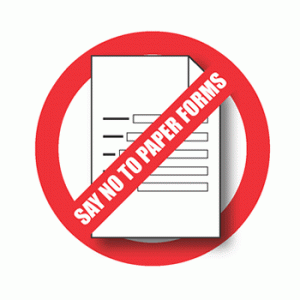 Western civilization will not end from Ebola or nuclear disaster. It will choke to death under forms and bureaucracy.
Western civilization will not end from Ebola or nuclear disaster. It will choke to death under forms and bureaucracy.
Our tour guide spoke with both hands as he tilted our van through corners on the Amalfi coast in heavy traffic. I raised his blood pressure by asking him about Italian politics.
He told me how his friend struggled as a chef.
“He spends more time filling out paperwork for government than cooking for customers!” he said in a thick accent.
Our guide gladly took cash for the tour. Everywhere else, we filled out paperwork with passport numbers so government could monitor the tourism industry.
Bureaucrats love forms. Without asking for much input, bureaucracy creates new forms like dandelions in spring.
Healthcare Bureaucracy
When politicians promise voters more healthcare services, it usually includes some kind of form for doctors to fill out. Forms take longer to fill, than patients take to see. Ergo, politicians’ promises produce less service, not more, if they include a form to fill out. (Thanks, Philip!)
For the most part, bureaucratic forms do not contain medication orders. They usually ask for signatures confirming medical condition, explanations about clinical features and regurgitated treatments that have all been recorded elsewhere. These forms get designed in cubicles to serve bureaucratic ends.
Provincial Ministries of Health and Medical Associations have bilateral provincial Forms Committees to try to limit the negative impact of forms on clinical care while still meeting bureaucratic goals. Even so, some frustrated physicians have created ‘Doctors Against Forms’ committees.
Helpful Forms: PPOs
However, clinicians want some forms. Medical pre-printed order sheets improve accuracy and save tonnes of time. Clinical protocols could be written out long hand by any physician any time. But PPOs that improve care move glacially through dozens of drafts reviewed by committees of non-clinicians and physicians with little experience on a specific PPO. Hospital Forms Committees hold enormous power. Without their imprimatur, patients don’t benefit from PPOs. It’s often easier to change an out-of-date form manually for each patient than to run the Forms’ gauntlet for an update.
Overregulation
Forms represent one tiny feature of overregulation. Healthcare bureaucracy always creates more work for itself. It will never go on a diet. Touting accountability and audit, micromanagement will always bloat, will always crave more control.
Bureaucratic bloat drives cost, increases frustration and, most importantly, limits service.
Nobody likes whiners. Providers drowning in bureaucracy sound like whiners when they speak up. The only way to definitively erase bureaucracy is to demonstrate a better alternative.
(photocredit: eformsfactory.com)

What’s the alternative? I’m really interested in a removing bureaucracy in health care. I’m a manager on a nursing unit, would the world implode if I allowed front line workers to design and alter their forms, bypassing the forms committee? I’ve had a form held up 9 months at the moment.
Great question, Matt! I completely agree. We get very little value for the time and effort required to run through the Forms Committee gauntlet.
Thanks for taking time to share!
Shawn